Organic farming has evolved into a worldwide phenomenon in the past few years, moving beyond being a niche method of agriculture. The Research Institute of Organic Agriculture (FiBL) reported that an area of 76.4 million plus hectares of land had been under organic farming in 190 nations and territories as of the end of 2021. The organic food market has also recorded a strong annual growth rate of well above 10%, and this signifies that the demand of the chemical free sustainably made food is on the rise, one of the key benefits of organic farming.
The organic movement has been taking off in India in an unprecedented manner, with the highest number of registered organic farmers in the country, that is, over 4.43 million organic farmers. India stands tall as the figurehead of organic farming in the world, as far as the number of producers is concerned. This is where the benefits of organic farming in India become especially significant, boosting both agriculture and community livelihoods.
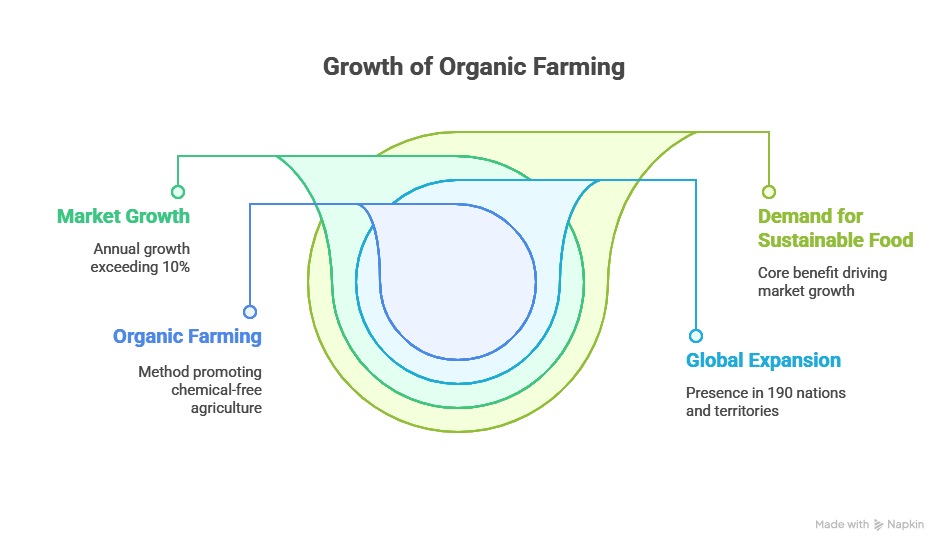
This trend is not only about our life and food preferences. It is a reaction to increasingly widespread worries about climate change, loss of farmland, biodiversity, and the health and long-term effects of exposure to synthetic chemicals. The solution to this problem appears to be organic farming, a practice which takes care of the environment, promotes human health, and provides economic benefits in rural areas.
Among the many benefits of organic farming, the impact on climate, health, and society is especially noteworthy. What then makes organic farming so good? What are the various benefits of organic farming in today’s world? Let us have a good look at them.
Also read: How to Start Organic Farming at Home
What Makes Organic Farming a Better Alternative?
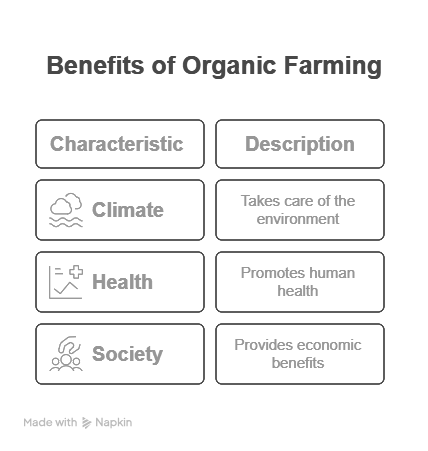
1. Better Soil, a Better Ecosystem
Organic agriculture starts with the soil; this is where it all started in agriculture. Organic methods, in contrast to the conventional form of farming, which may use artificial fertilisers and crop monocultures, emphasise the fertility and structure of the soil using compost, green manure, crop rotation and natural amendments. One of the most vital benefits of organic farming lies here, in building a living, breathing soil.
Good soil is dynamic, and it is full of billions of microorganisms which work together with plants to increase growth, combat diseases, and absorb nutrients effectively. This microbial life is enhanced by organic practices to form an auto-sustainable system. The benefits of organic farming in India become evident when you see how it restores soil fertility in rural farmlands.
The reason for it is important:
- It averts soil erosion.
- Improves water retention abilities
- Also promotes carbon sequestration, hence contributing towards fighting climate change.
As reported by Rodale Institute, farm systems with organic methods enhance 15-28 per cent of soil carbon compared to mainstream farming is clear evidence of benefits for organic farming.
2. Decreased Contact with Damaging Pesticides
According to a 2019 study published in Environmental Research, individuals who followed an organic diet and ate only organic foods in a short-term experiment (six days) experienced a significant reduction in the level of pesticide metabolites in their bodies (60-70 per cent). This is one of the life-changing benefits of organic farming: a diet free of toxic chemicals.
The fact that organic farming does not use artificial pesticides and herbicides can be listed among the best benefits of organic farming in India. These are some of the chemicals that, although they are successful in producing higher outputs they, however, have some negative effects on human health (including hormonal disruption, neurological disorders, and even some types of cancers).
Instead, organic farming employs natural means of pest management whereby predator insects are introduced or using neem extract or even through planting of trap crops. The benefit of organic farming is chemical residue-free food.
3. Organic Fields Deliver More Biodiversity
Organic farms are sacred places of biodiversity. They grow various crops, other vegetation, and do not use chemicals that affect non-targeted species negatively. This biological richness is one of the major benefits of organic farming, supporting pollinators, native species, and more.
Due to this, bees and butterflies, as well as birds, do well in organic environments. Natural organisms such as ladybugs and lacewings, which serve to control the population of pests, are also very important. As remarked in a report by FiBL published in 2020, there are 30 per cent more plants, birds, and insect species found on an organic farm than on conventional ones, illuminating the benefits of organic farming in India.
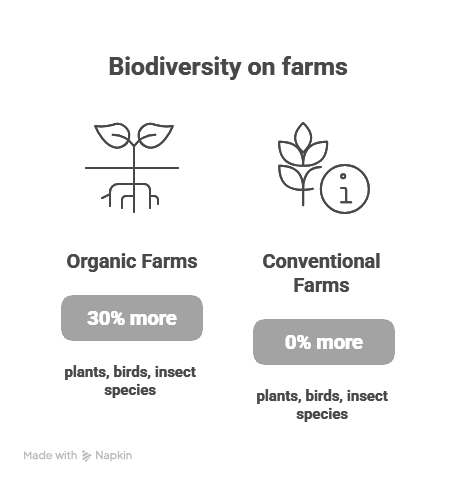
4. Organic Farming Accomplishes Climate Change
In several ways, organic farming aids resilience to the climate:
- Reduced greenhouse gas emissions
- Retrenchment of fossil fuels
- Better carbon storage in soil
- Increased resistance against drought and floods
Organic farming keeps greenhouse gas production to a minimum by avoiding the use of synthetic nitrogen fertilisers, which are among the greatest producers of nitrous oxide emissions, exhibiting the major benefits for organic farming.
As stated by the FAO, the energy consumption of organic systems is 30-50 percent lower than sources of traditional farming, based on every square foot of acreage. And the organic soil also has water content, so it might be irrigated 30 per cent less than ordinary soil, which aids in a better ecosystem and also adds to the benefits of organic farming for water-stressed areas.
5. Enables the Small Farmers and Rural Communities
The reason why organic farming poses a sustainable economic solution in nations such as India, where agriculture is practised by more than 50 per cent of the entire population, is that organic farming is economical, more so for the smallholder farmers.
This will help farmers save input costs and earn high prices on produce since they will not rely on highly expensive chemicals and genetically modified seeds, becoming the strongest benefits of organic farming in India. The International Federation of Organic Agriculture Movements (IFOAM) suggests organic produce has the potential of being as much as 20-40 per cent more expensive on the market.
This cost-benefit ratio revolutionises rural livelihoods and shows strong benefits of organic farming. Furthermore, organic agriculture enhances the local labour, learning and development of communally-based projects such as farmers’ markets and cooperatives, another critical benefit of organic farming in the social sense.
6. Organic Food Tastes Better and Is Healthier
The thing is that organic food can be better tasting, it has more flavour and texture since it is grown using well-balanced soil and was harvested during its prime. Organic food is also healthier, especially when it comes to antioxidants, vitamins and necessary minerals, proving the nutritional benefits of organic farming.
The British Journal of Nutrition (2014) concluded that the organic crops had up to 65 per cent increased antioxidants than conventionally grown crops. They contained fewer heavy metals, such as cadmium, as well. Organic produce has better taste, better nutrition and fewer toxins; this is one of the everyday benefits of organic farming in India.
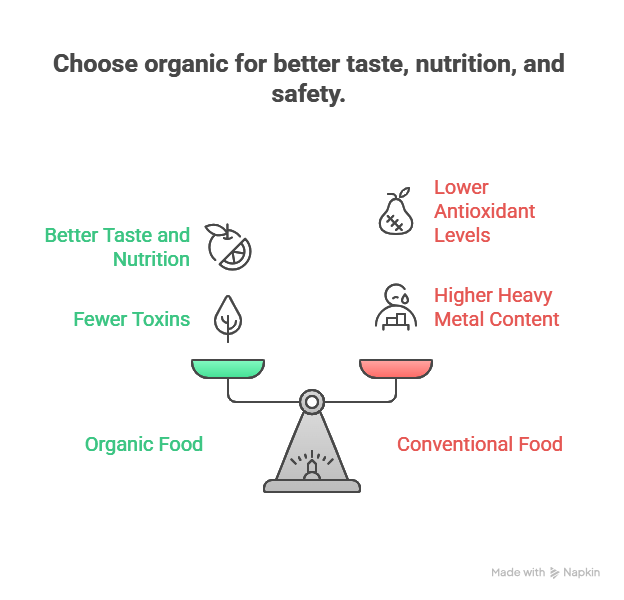
7. Antibiotics, Growth Hormones and GMOs Free Produce
Organic farming does not allow the application of genetically modified organisms (GMOs). Although the GMO-free debate still continues on whether it is good or bad, a large number of consumers would like to switch to organic produce and to feel secure over the fact that their food is not being genetically manipulated in a lab. Organic standards are at a high point when it comes to livestock and benefits for organic farming:
- Animals should be fed with non-GMO organic feed
- No routine antibiotics and/or growth hormones
- Opportunity to run free and be gently treated
Organic farming translates to fewer antibiotics throughout the food chain, and is a well-known benefit of organic farming, which is essential in order to overcome antibiotic resistance, which is becoming a major concern in hospitals all across the globe.
8. Organic Farming Leads to Clearer Water and Lesser Pollution
The conventional farming technique usually releases fertiliser garbage, pesticide, and nitrate through the runoff into the neighbouring river and lakes, which destroy aquatic life and the quality of drinking water. Organic farming has everything to do with these pollutants. Organic fields have fewer runoffs and better infiltration with the help of better soil structure and natural composts.
EPA reports that agricultural runoff can be considered a cause of pollution of waterways in the United States. This risk can be greatly compensated by organic practices. Essentially, when we go organic, we are ensuring that we save our most valuable asset, which is clean water.
9. Organic Produce Can Be Both Affordable and Accessible
The most talked-about myth concerning organic food is that it will always be expensive. Conventional food may come at a higher price because of intensive labour-requiring processes and the low yields; the real price of conventional food (cost on health, environment, and diversity) is well kept secret.
In addition, due to the fact that organic farming is becoming more industrialised and its supply better organised, the costs are gradually falling. Organic workspace is also becoming more and more available through government subsidies, awareness programs and opportunities to assist farmers, particularly in developing countries.
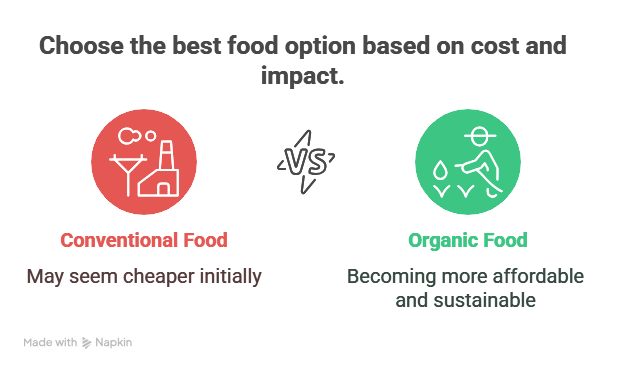
The best way to adapt organic farming is by starting small, paying attention to potentially hazardous products such as spinach, strawberries, and apples (they are usually included in the list of the Dirty Dozen), and purchasing organic variants of them first.
Ways of Tracing Organic Produce in Your Everyday Life
Making the switch to an organic lifestyle does not need to be very demanding. The following are some steps for getting started:
- Shop to buy local and seasonal produce.
- Get involved in community-supported agriculture (CSA) programs.
- Grow some herbs or vegetables: even a balcony pot of veggies and herbs helps.
- Try to find certified organic brands, India Organic, USDA Organic or Jaivik Bharat.
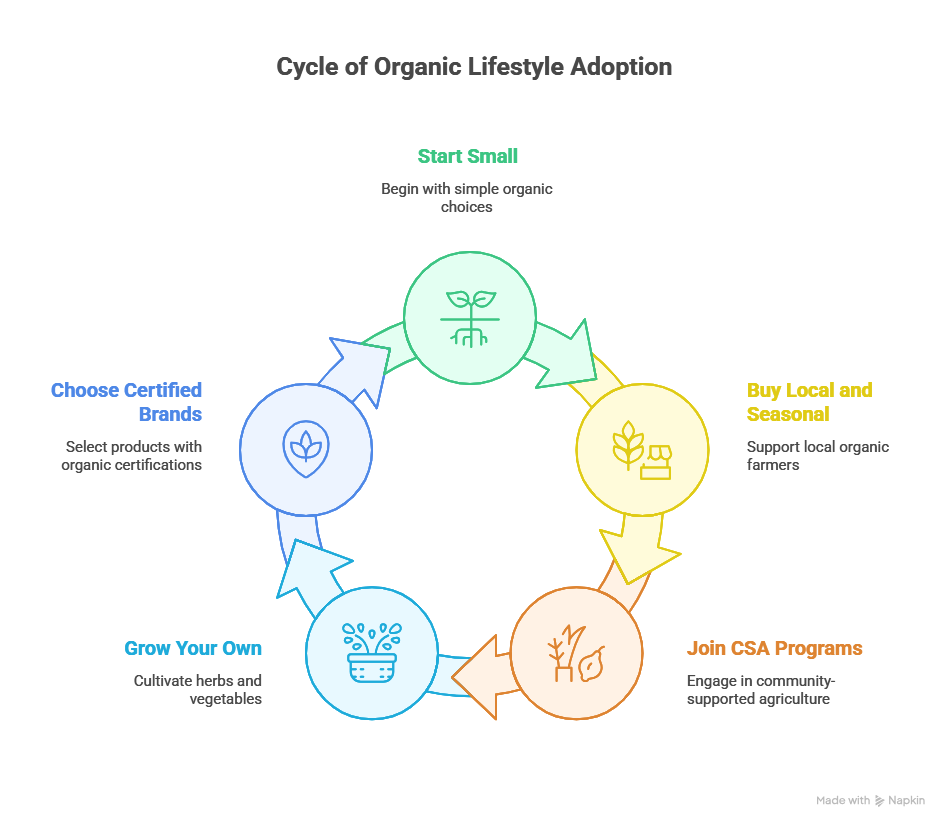
Each small act contributes to the bigger benefits of organic farming, nudging the food system in the right direction.
Conclusion
Plate by plate, bite by bite, your decisions can lead the demand and define farming in the future. Organic farming is not just a traditional agricultural coming back to the roots, but is a revolution that is based on sustainability, health and environmental respect. Organic farming creates a future in a world affected by climate anxiety, chronic illness and the instability of the ecological balance, healing the earth and communities, and feeding humanity.
It does not matter whether you are a farmer or a consumer, being careful about the food you choose, keep in mind this is the case every organic step is important and poses adequate benefits for organic farming. When we farm carefully, we harvest not only food, we feed hope for the generations.


2 thoughts on “Top Benefits of Organic Farming in India You Should Know”